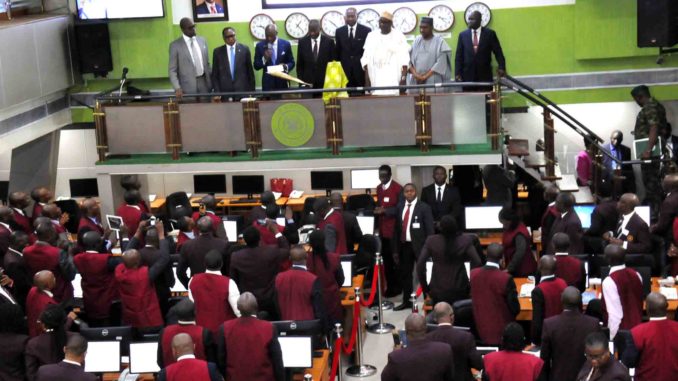
The Nigeria Stock Exchange (NSE) recorded appreciable growth last week with the market indices rising by 7.46 per cent.
The volume and value of shares traded also rose by 183.48 per cent and 175.29 per cent, respectively.
Specifically, the All-Share Index appreciated by 1,956.83 points or 7.46 per cent to close at 28,192.46 against 26,235.63 achieved in the preceding week.
Also, the market capitalisation, which opened at N9.069 trillion, rose by N62 billion to close at N9.745 trillion due to huge price gains posted by some blue chips.
Similarly, all other Indices finished higher last week with the exception of the NSE ASeM Index that closed flat.
May and Baker led the gainers’ table in percentage terms, gaining 31.96 per cent or 31k to close at N1.28 per share.
Ecobank Transnational Incorporated followed with a gain of 22.50 per cent or N1.80 to close at N9.80, while Fidson Healthcare improved by 22.50 per cent or 34k close at N1.92 per share.
On the other hand, Jaiz Bank topped the price losers’ chart in percentage terms, shedding 9.09 per cent or 10k to close at N1 per share.
Seplat trailed with a loss of 5.88 per cent or N25 to close at N400, while Newrest ASL depreciated by 5.63 per cent or 28k to close at N4.60 per share.
A total of 3.26 billion shares worth N28.74 billion were traded in 25,370 deals last week against 1.15 billion shares valued at N 10.44 billion exchanged in 16,676 deals in the preceding week.
The Financial Services Industry led with 2.72 billion shares worth N17.23 billion traded in 15,103 deals.
The sector contributed 83.42 per cent and 59.96 per cent to the total equity exchanged in turnover volume and value terms, respectively.
The Consumer Goods sector followed with 185.75 million shares worth N6.59 billion in 3,817 deals.
The third place was occupied by Conglomerates sector with 156.01 million shares valued at N385.43 million achieved in 1,340 deals.
Dr Uche Uwaleke, the Head of Banking and Finance Department at Nasarawa State University in Keffi, told the News Agency of Nigeria (NAN) that the recent bullish trend was due to a number of factors such as the accretion to foreign reserves on the back of favourable crude oil prices and increased oil production.
Uwaleke said that the relative stability in the naira exchange rate was due to sustained CBN interventions through the special foreign exchange window opened for foreign investors by the Central Bank of Nigeria (CBN).
He said that the launch of the Economic Recovery and Growth Plan also boosted confidence in the economy.
Uwaleke said that increase in the amount of investible funds in equities by pension funds, good financial results posted by many quoted companies in spite of the economic recession and the recent favourable reports by Fitch and Moody on the stability of banks in Nigeria were all responsible for the trend.
“In the coming weeks, the market will be positively affected by the passage of the 2017 Appropriation Bill. However, one should expect profit taking to have a dampening effect on the overall stock performance,” he said.